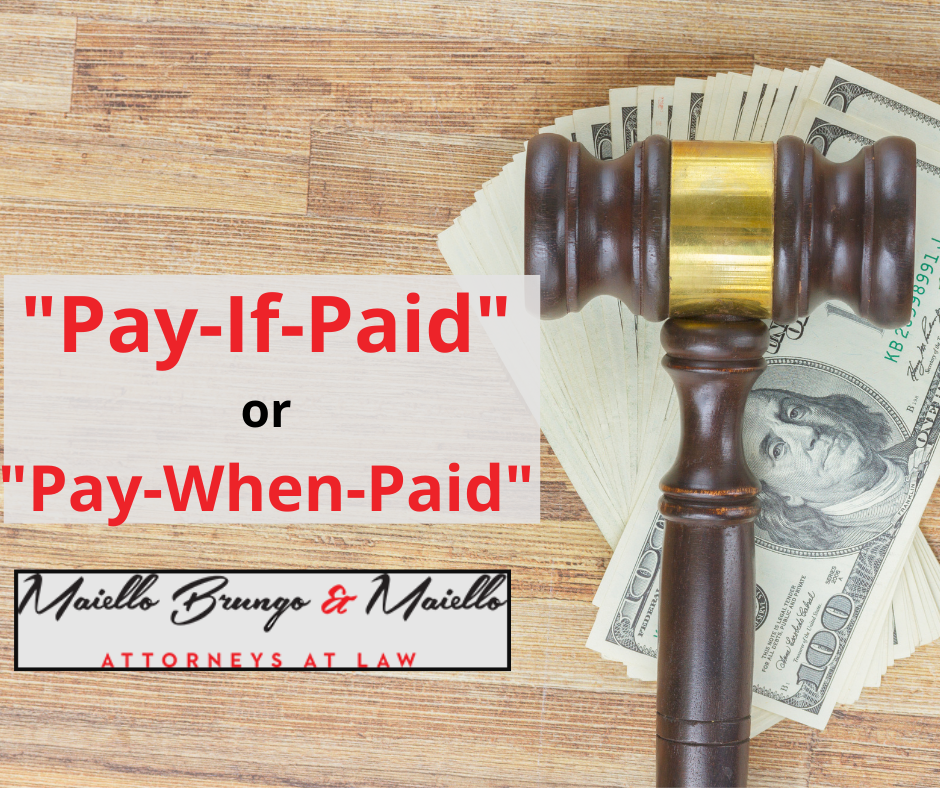Contractual payment provisions play a crucial role in determining when payment is due. Depending on the circumstances, they can help resolve construction project issues or payment issues. Understanding your contract’s payment provisions before problems arise is therefore vital to preserving your rights.
One of the most common and controversial payment provisions in construction contracts are clauses that alter normal payment obligations. These provisions typically fall within one of two categories: (1) “pay-if-paid” clauses; or (2) “pay-when-paid” clauses. These two construction contract clauses are contractual conditional-payment provisions primarily intended to shift the risk of loss related to non-payment. Importantly, these two clauses identify who ultimately bears the risk of owner nonpayment.
If you need the help of experienced Pennsylvania attorneys to review your contract, contact MBM Law today.
What Is a “Pay-If-Paid” Clause?
A ”pay-if-paid” clause is a clause that only obligates the contractor to pay a subcontractor/supplier if the contractor receives payment for the subcontractor’s work from the owner. The Courts in Pennsylvania have traditionally interpreted “pay-if-paid” clauses as “conditions precedent” to payment. A condition precedent is an event, not certain to occur, which must occur before payment is due. As a result, these types of clauses are often problematic for unpaid contractors/suppliers, because they place the financial risk or risk of non-payment by the owner squarely on the shoulders of the unpaid subcontractor/supplier.
If you have questions about your Pay-If-Paid contract, MBM Law can assist.
What Is a “Pay-When-Paid” Clause?
In contrast, “pay-when-paid” clauses are provisions that only govern the timing of a contractor’s payment obligation to the subcontractor, usually by indicating that the subcontractor will be paid within a specified time period after the contractor itself is paid by the property owner. The Courts in Pennsylvania have traditionally found that these types of clauses do not establish a condition precedent, but rather merely are timing provisions. As a consequence, under them, a general contractor bears the risk that the owner will never pay them, and they cannot be used to absolve a contractor from his obligation to pay subcontractors.
The Importance of Clauses in Construction Contracts
Because of this distinction, the question of whether a contractual payment provision is characterized as a “pay-if-paid” clause or a “pay-when-paid” clause can be of critical importance to an unpaid subcontractor or supplier. Recognizing this and the harsh outcomes that can flow from “pay-if-pay” clauses, the Courts construe them strictly and require language, which specifically indicates a clear intent to create such a condition, rather than just the term “pay if paid.” The Courts have also adopted the prevention doctrine and will not enforce “pay-if-paid” clauses if the general contractor prevents the occurrence of the condition precedent by causing or being partially responsible for the non-payment by the Owner.
Legal Issues in Construction Contracts
MBM’s local construction lawyers know that one of the greatest realities of the construction industry is being paid in a timely manner. It is a continual cycle of delays caused by payment issues that put reputations and businesses’ continuation in peril.
Anticipating payment issues and knowing what to do if you encounter one of these situations, can mean the difference between success and failure on a construction project. For an owner, it can mean the difference between a project that stays on budget or one that exceeds the amount of available funds, leading to claims, foreclosures, and bankruptcies. For contractors and subcontractors, it can be the difference between staying in business or going under.
The Maiello Brungo & Maiello Construction Law Team is staffed with experienced construction lawyers, who have years of experience representing contractors, subcontractors, design professionals, and owners in hundreds of complex construction-related matters. This experience allows them to guide their clients through the murky legalese of contract provisions. It allows them to quickly identify and direct our client’s attention to those provisions which may impose severe burdens or risks during the performance of the contract and to help them develop strategies or arguments to counter onerous provisions like “pay-if-paid” clauses so that they can quickly secure payment and/or maximize the client’s recovery on those occasions when disputes and litigation become inevitable.
Contact the Pittsburgh office of MBM Law today.


